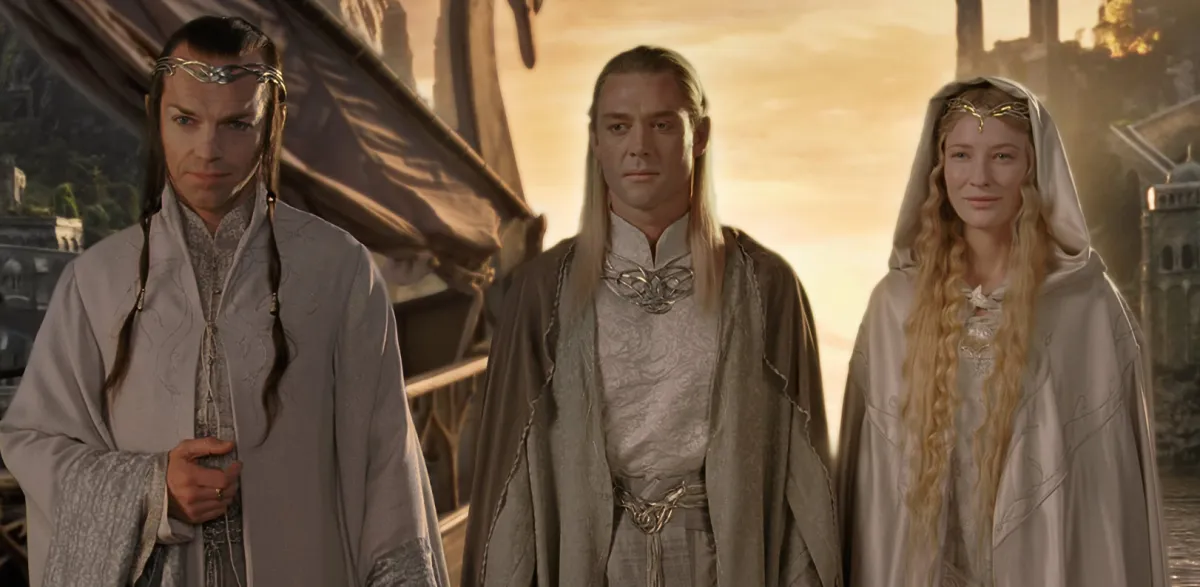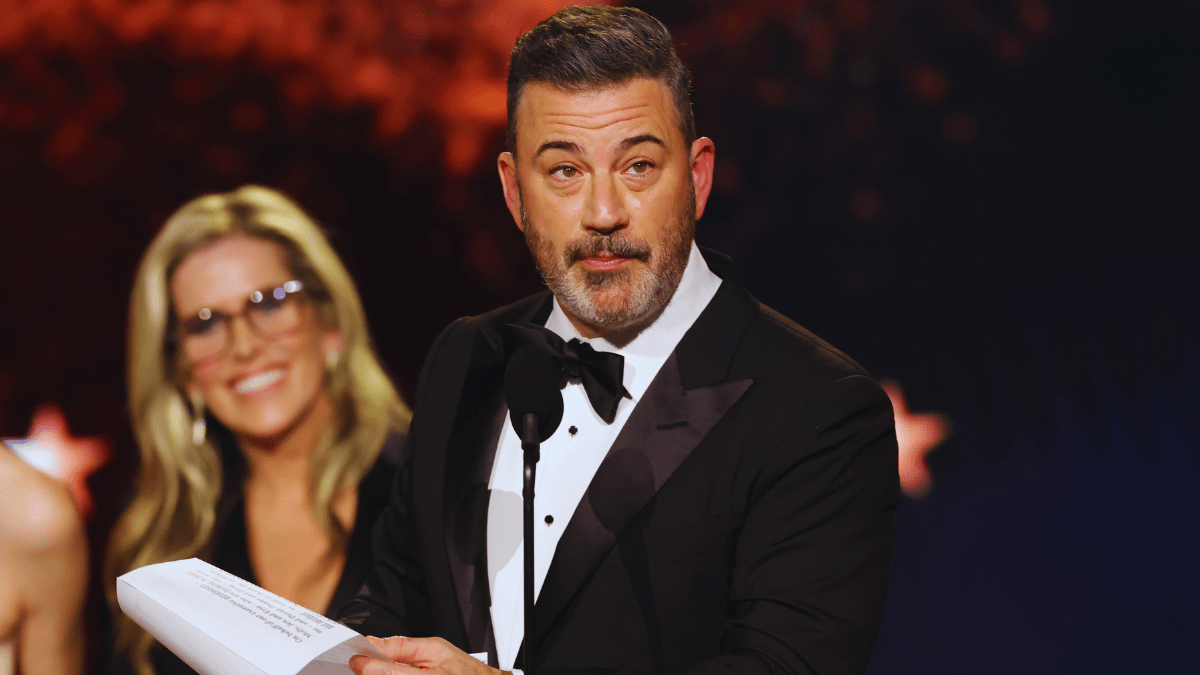Amazon’s The Lord of the Rings: The Rings of Power takes us back a few thousand years, back to the time when Elves ruled supreme over Middle-earth and held sway in all the lands. The show itself named Elven legends such as Galadriel, Elrond, Gil-galad, and Celebrimbor as protagonists that lead its ensemble, so might be a good idea to take a look at the history of Arda’s creation and review the role the Eldar played in shaping Middle-earth and defending the virtues of what the Valar had created against the evil of Morgoth, the Black Foe of the World.
In another article recently published on the website, we talked about the song of creation and how the Ainur came to shape the world, with the greatest among them introducing a counter-harmony that wrought much evil to Eru’s creation. After Melkor stole the Silmarils and destroyed the Two Trees of Valinor, Fëanor of the Noldorin swore vengeance against him and named him Morgoth, convincing the rest of his skin to chase the Dark Lord across the sea and into Middle-earth. Thus began the great pilgrimage, with the Elven houses making their way to Middle-earth and founding numerous kingdoms there, opposing the evil of Morgoth which spread from his fortress of Angband to the north.
For hundreds of years, they toiled to keep Morgoth at bay, and even when he was defeated, the Elves continued to stand watch over Middle-earth and prosper as a civilization in Gil-galad’s kingdom in the Second Age. The Rings of Power mostly deals with the events of that period, though if we were to list the most influential Elves in the history of creation, the journey would take us farther back to the time the first of the Eldar were saved by the Ainur and brought to Aman.
Here’s a list of 10 influential Elves in Middle-earth’s history, in roughly chronological order.
1. Finrod Felagund
Finrod was a Noldorin Elf whose destiny changed the course of history in none too subtle ways. In the First Age, he became the King of Nargothrond and fought against Morgoth during Dagor Bragollach. The eldest son of Finarfin and brother to Galadriel, Finrod lived an adventurous and honorable life, going down as one of the few Elves who didn’t stoke the fire of the Valar by following Fëanor in his folly, though he did make his way to Middle-earth with the House of Fingolfin.
Finrod was the one who founded the original Minas Tirith in the First Age, which then was a watchtower overlooking the Pass of Sirion. A short while after his reign had begun, Finrod encountered the other Children of Eru, the Men, as the first Noldorin Elf to do so. Finrod learned about Men’s culture and taught them the ways of the Elves in turn, developing a close bond with the House of Beor.
When Morgoth initiated Dagor Bragollach after centuries of being besieged inside Angband, Finrod gathered a great host and made a stand against the swarm of the Dark Lord’s forces. Many Elves died during that tragic event, but thanks to Barahir of House Beor coming to his rescue, Finrod managed to survive the encounter. To thank him, Finrod gifted Barahir his ring, which went on to be known as the Ring of Barahir, and passed down to Aragorn in the Third Age when he learned of his ancestry.
Some years after the onslaught, Barahir’s son, Beren, came to Finrod asking for his help in the Quest for the Silmaril. The plan was to infiltrate Angband and steal one of the eponymous jewels from Morgoth’s crown. Beren wanted the jewel as the bride price for Luthien’s hand, and she accompanied him on the journey. Sauron managed to ensnare the party, however, but Finrod gave his life to protect Beren from being eaten alive by a wolf set upon them by Sauron.
2. Fingolfin
The eldest son of Finwe and the half-brother of Fëanor, Fingolfin was the first King of Noldor after Fëanor’s death at the hands of Morgoth. When Fëanor swore vengeance against the Black Foe after the Dark Lord stole the Silmarils, he initiated the first kinslaying by fighting the Teleri Elves and forcefully seizing their ships. Fingolfin’s reluctance to join his half-brother proved a terrible mistake, as by arriving later at the scene, he had no choice but to fight the Teleri with the rest of the Noldorin.
Fingolfin had two choices; to return to Aman and face the Valar’s wrath, or to continue to Middle-earth through the dangerous landscape of Helcaraxe. He ultimately chose the latter, hoping to confront his brother for his treachery. After learning about Fëanor’s death, Fingolfin’s son Fingon successfully saved Maedhros, Fëanor’s eldest son, from Morgoth’s reach. This united the Noldorin once again, making Fingolfin the first High King of Noldor.
During Dagor Bragollach, the desolation that Morgoth wrought upon the Elves was so tragically vast that Fingolfin decided to challenge the Dark Lord to single combat out of pure rage. He rode to the very gates of Angband and called Morgoth forth, which the sinister villain obliged for fear of appearing weak in front of his lieutenants, Sauron among them. Fingolfin and Morgoth fought for a long time, and Fingolfin managed to wound the Dark Lord seven times, but weariness ultimately made him stumble. Morgoth used this opportunity to pin Fingolfin down and crush his neck. And it was at this moment when Thorondor, then the King of Eagles, descended upon the villain and retrieved the king’s remains.
3. Fëanor
It would be no overstatement to suggest that Fëanor was the greatest of the Elves despite all the character flaws and treacheries that brought his kin to suffering and ruin. He was a talented gem-smith, and the maker of the Silmarils, the most prized jewels in the universe that caused great turmoil to the world of Arda. Fëanor is also credited with the invention of the Palantiri, communications devices that were used even as late as the final years of the Third Age and the War of the Ring.
Fëanor created the Silmarils by capturing the intermingled light of the Two Trees, but the means remain unknown. He became obsessed with the jewels and the praise they had gained him, turning more aloof from the rest of his kin as the years passed by. When Morgoth was released from his imprisonment, he returned to Valinor with the great spider Ungoliant, and the two destroyed the Two Trees and stole Fëanor’s prized Silmarils. In his rage and pride, Fëanor cursed Morgoth and swore an oath to enact vengeance on him, convincing the rest of his kin to give chase to the Dark Lord despite the Valar’s insistence on the contrary.
The Elven king pushed on, however, and even committed the first kinslaying by fighting the Teleri. He then betrayed his half-brother Fingolfin and left the rest of the Noldorin forces without any means to cross the Sundering Seas by setting the Teleri ships on fire. When Fëanor landed on Middle-earth, Morgoth sent forth an enormous host to rout him, but the Elves defeated them with ease. This emboldened Fëanor to push towards Angband itself with a small vanguard, but that ultimately proved to be his doom. When there, a group of Balrogs descended on Fëanor’s vanguard, slaying them all and severely wounding Fëanor himself. The dying Elf made his sons continue opposing Morgoth and then perished when his spirit left his body at last.
4. Lúthien Tinúviel
Lúthien, along with her mortal husband Beren, is two of the most important characters in all of Tolkien’s creations. Lúthien was an Elven princess born to King Elu Thingol of Doriath and Melian, his Maia queen. She is said to have been the most beautiful creation of Eru, in whose grace, winter would melt into spring. When Beren, the offspring of Barahir, came to Doriath with Morgoth’s minions on his tail, he met Lúthien in Doriath’s forests. There, he saw her dancing and immediately fell in love. Their love and ultimate tragic passing is the subject of many songs in Middle-earth, one of which Aragorn, son of Arathorn, recounts when taking the Hobbits from the Shire to Rivendell.
When Beren asked Thingol for Lúthien’s hand, the king set upon him an impossible task; Beren was to bring him one of the Silmarils from Morgoth’s jewel. Lúthien herself helped Beren in this task, infiltrating Morgoth’s court and even putting the Dark Lord to sleep with song. While the quest was successful, it resulted in the deaths of Finrod and Beren. Lúthien perished after her lover in grief, appearing in the Halls of Mandos and singing such a beautiful song that it moved the king of the dead to consult with Manwe and Eru. Lúthien was ultimately given two choices; to be resurrected in Valinor and forever live in bliss, or be restored to life alongside Beren as a mortal. Lúthien chose the latter and returned to Middle-earth to live a short life alongside Beren.
5. Eärendil
We couldn’t confirm this beyond the shadow of a doubt, but Eärendil may very well be the first character Tolkien conceived when he first thought about creating a mythology. Eärendil was a Half-elven mariner, born to Tuor, a great hero of Men, and Princess Idril, daughter of Turgon, who was the High King of Noldor presiding over the hidden Elven city of Gondolin. Eärendil and his parents managed to escape the destruction of Gondolin, and some years later, he married Elwing and became a father to Elros and Elrond, the Lord of Rivendell from The Lord of the Rings.
Elwing had inherited the Silmaril that Beren stole from Morgoth, and when Eärendil grew weary of the tragedies that were befalling the Elves and Men at the hands of the Black Foe, they decided to sail for Valinor to plead for the Valar’s aid. The Silmaril helped them navigate the terrifying waters of the Sundering Seas, and once there, their audience with Manwe finally persuaded the Valar to let bygones be bygones and help the Noldorin and all the rest of the Children of Iluvatar. Since Eärendil had taken this journey not for his own sake, but for the sake of the Free Peoples, Manwe also granted him and his kin a gift, allowing them to choose to be either immortal Elves or mortal Men. Elwing chose to remain an Elf, and though Eärendil had a fondness for Men, he chose to be an Elf also for Elwing’s sake.
And so it was that the Host of Valinor arrived at Middle-earth and challenged Morgoth. In the war that ensued, Eärendil dealt Ancalago the Black, the greatest of dragons in Arda, a lethal strike, which killed the enormous firedrake and tipped the balance in the favor of the forces of the light. It is also prophesied by Mandos that Eärendil will return at the end of time and help Turin Turambar fight Melkor.
6. Galadriel
The Lady of Galadhrim is not only one of the most influential Elves in the course of history, but also the main protagonist of the upcoming Rings of Power show. Galadriel was the daughter of Finarfin, and so became known as the Daughter of the Golden House. In the First Age, Galadriel took part in Fëanor’s rebellion, though ultimately refused to have a hand in the kinslaying and followed Fingolfin’s host to Middle-earth through Helcaraxe.
In the years that followed, Galadriel chose to remain in Doriath and didn’t interfere with the war against Morgoth, thinking that the strength of the Eldar was insufficient in the task of toppling the Dark Lord. It was also at this time when she met Celeborn, her future husband, and gave birth to a girl named Celebrian. Celebrian would go on to marry Elrond, which makes Galadriel Arwen’s grandmother.
Not much is known about Galadriel’s exploits in the Second Age, other than the fact that she was wary of Sauron even before knowing his identity as a lieutenant of Morgoth. When the Elves of Eregion forged the Rings of Power, Galadriel was entrusted with one of the Elven rings, Nenya, though she never used it so long as it was bound to the One Ring.
Galadriel didn’t directly influence the War of the Ring in the Third Age, but through her gifts to the Fellowship, he ensured their survival many times over. She also instructed Aragorn about taking the Paths of the Dead and encouraged the Dúnedain to go south and help their king-to-be. It is implied that Galadriel was almost as strong as the greatest of their race, Fëanor, before his downfall.
7. Elrond
When Elwing fled the sons of Fëanor with the Silmaril and sought Eärendil, she left her sons Elrond and Elros to be raised by Maglor, who was one of the sons. Maglor had no love for the two boys, though, over time, he grew to love them as his own. After the war against Morgoth ended, the Valar gave the brothers the same choice they gave Eärendil, to be counted among Elves or Men. Elros chose to be a Man and went on to become the first King of Númenor. Elrond, on the other hand, remained an Elf and became a steward of Gil-galad in his kingdom of Lindon in the Second Age (which will be depicted in The Rings of Power.)
Elrond was instrumental in the struggle against Sauron during the Second Age. When the Dark Lord laid siege to Gil-galad’s domain, Elrond was sent with a host to protect Eregion, but he arrived too late. Elrond then retreated to the pass of Imladris, there building Rivendell as a fortress and defending it against Sauron until the armies of Númenor came to his aid. He later fought side-by-side with Gil-galad in the War of the Last Alliance, which we saw depicted in Peter Jackson’s The Fellowship of the Ring.
When Thorin Oakenshield’s company sought refuge in Rivendell, Elrond helped them with their quest. 60 years later, he sent out riders to help Frodo of the Shire reach Rivendell, and one of them, Glorfindel in the books and Arwen in the movies, managed to successfully deliver the wounded Hobbit from his Black Rider pursuers. Elrond eventually left Middle-earth for Valinor with the rest of the remaining ring-bearers at the end of The Lord of the Rings.
8. Celebrimbor
The Noldorin prince was the last of the cursed line of Fëanor, and he lived through many conflicts and struggles that already turned him into something of a legend by the time the Second Age of Middle-earth came about. Celebrimbor fought in Dagor-nuin-Giliath, Dagor Aglareb, survivved Dagor Bragollach and the Fall of Gondolin, and even the War of Wrath.
In the Second Age, Celebrimbor chose to remain in Middle-earth and came to Eregion, where he continued to perfect his art of smithing. When Sauron started to stir again, he came to Eregion in the guise of Annatar, Lord of Gifts, and introduced himself as the Valar’s emissary. He taught the Elven smiths to craft rings, but Celebrimbor never trusted him. Ultimately, Sauron instructed the smiths to create the Rings of Power, and Celebrimbor took it upon himself to make the three Elven rings, crafting them in a way that remained untainted by Sauron’s touch.
When Sauron forged the One Ring and bound all the others to his will, the Elves figured out his deception and Celebrimbor withheld the three rings from him. This enraged Sauron, who attacked Eregion and laid waste to the ringmaker’s realm. Torture him as he did, though, Celebrimbor would not reveal the location of the other rings. Sauron had Celebrimbor shot with arrows and hanged, taking the last revenge on the House of Fëanor, whose last member, unlike all that came before him, was selfless and humble.
9. Glorfindel
For those who’ve only read The Lord of the Rings, Glorfindel might come off as an enigmatic figure. For those who’ve only watched the movies, the name Glorfindel won’t even ring any bells. Nevertheless, he was one of the greatest of the Elven-kind to ever live. Before the First Age, Glorfindel was one of the few who took no part in the kinslaying, and was thus saved from the doom that befell all who did. During the war against Morgoth, he fought in many battles, but perhaps his greatest moment was during the Fall of Gondolin, where he and a group of others under his command held a chokepoint against the swarm of Morgoth’s forces and continued to do so until Glorfindel himself fell in a one-on-one fight with a Balrog.
Due to his valiant defense of Gondolin, which saved many Elven lives, Glorfindel was brought back to life by the Valar and sent to Middle-earth as an emissary. In the war against the Witch-King, Glorfindel swept through the field and turned the tide of battle, though when Earnur rode to pursue the fleeing Witch-King, Glorfindel stopped him and prophecized that “not by the hand of man will he fall.” In the Third Age, he found a wounded Frodo and led the Hobbits to Rivendell, fighting and driving away the Nazgul all the while.
10. Arwen
Arwen was the half-Elven daughter of Elrond born in the Third Age. When she met Aragorn in Rivendell, the heir of Isildur mistook her for Luthien due to her beauty, and Arwen said that the likeness has been recounted many times before. Over the decades that followed, Arwen and Aragorn became intertwined as passionately as Beren and Luthien several thousands of years before them.
While the character is not in The Lord of the Rings and only appears in the appendices, her love was instrumental in Aragorn’s success in uniting the realms of Men and opposing the evil of Sauron. Arwen is also important as one of the last living Elves on Middle-earth, who, upon choosing to wed Aragorn, assured that the “Dominion of Men,” after all the Eldar had passed on to Aman, would at least retain some connection to the Elves through Eldarion, her son with Aragorn.
Thus the song of the Eldar came to an end, “and long ago they passed away, in the forest singing sorrowless…“










Published: Aug 28, 2022 10:58 am